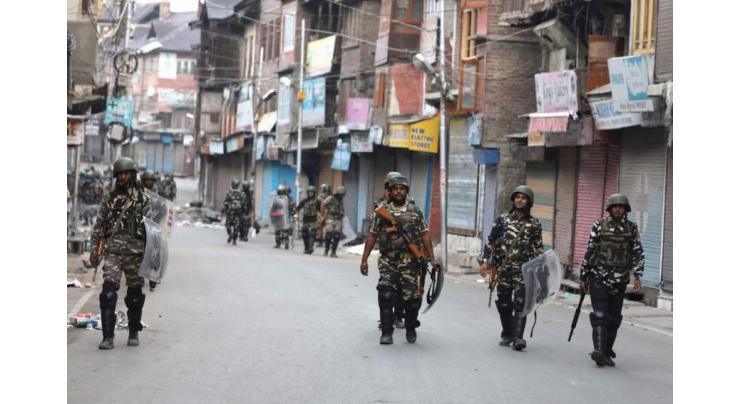
- Home
- Kashmir
- News
- India's move of revoking special status of Kashmir could prove dangerous: China Daily
India's Move Of Revoking Special Status Of Kashmir Could Prove Dangerous: China Daily
Fahad Shabbir (@FahadShabbir) Published August 15, 2019 | 10:33 PM

By revoking the special status of Indian occupied Kashmir and splitting it into two union territories of Jammu and Kashmir, and Ladakh, New Delhi has opened a Pandora's box
India's unilateral move to fundamentally change the administrative division of the region and seize Pakistani and Chinese territories have angered its two neighbors and invited strong reactions from both, according to an article published by China Daily here on Thursday.
New Delhi's intention may be to completely change the status quo of the disputed region by revising its domestic law. But its careless move could put the already fragile geopolitical balance at risk, with many fearing the situation could deteriorate in the future.
To begin with, the security situation in Kashmir could take a turn for the worse. Ever since Kashmiri leader Burhan Wani was killed by Indian security forces on July 2016, the troubled region has been mired in clashes between Indian forces and Kashmiri protesters.
Given their strained relations with the Indian security forces, Kashmiri people fear that by abrogating the region's special status, which endowed the region near-autonomous rights, the Indian government aims to change the demography of the region.
Thousands of Indian troops were deployed in Kashmir before the Indian government revoked Kashmir's special status. Just weeks before the move, some reports said Indian forces had used cluster bombs against civilians along the Neelum River causing many casualties.
For more than a week, telephone, mobile phone and internet services have been suspended in Indian occupied Kashmir. And while all main roads are blocked, top Kashmiri politicians have been put under house arrest.
Against this backdrop, armed militants could trigger a new round of violence in the restive region and the resulting security disaster could trigger a devastating storm in South Asia.
Second, India's reckless move to change the legal status of Kashmir could deal a lethal blow to India-Pakistan relations. The Kashmir issue led to three wars between the neighbors, and Pakistan sees India's latest move as infringing on its national sovereignty and security interests, which mean India's move in Kashmir will put India-Pakistan relations to further test.
Third, the conflict between Hindus and Muslims in India could intensify.
Since coming to power in 2014, the Bharatiya Janata Party has been aggressively promoting its Hindutva agenda leading to increasing attacks on Muslims and Christians, even lower caste Hindus.
In fact, Indian Prime Minister Narendra Modi was re-elected earlier this year by taking a strong position against Pakistan and stirring up Hindutva sentiments among the majority community.
Yet Hindutva could lead India-Pakistan relations to a point of no return, and aggravate the conflicts between different communities, religious groups, and the upper and lower castes in India.
As a double-edged sword, Hindutva could win the support of the majority community, mostly the upper castes, but it could also spell trouble for the BJP government if it cannot meet the Hindu nationalists' increasing and absurd demands.
The international community has largely criticized India's move and expressed deep concern over the situation in Kashmir.
UN Secretary-General Antonio Guterres recalled the 1972 Simla Agreement between India and Pakistan, which states the "final status of Jammu and Kashmir is to be settled by peaceful means" and in accordance with the UN Charter.
While India argues the Kashmir dispute is a bilateral issue between New Delhi and Islamabad and not subject to third-party mediation, the UN Security Council could get involved if the situation in Kashmir continues to worsen and tensions between India and Pakistan reach a flash point, because the UN Charter states that the UN Security Council has the responsibility of safeguarding international peace and security.
Essentially, the Kashmir conflict is a dispute leftover by colonial history and should be peacefully resolved according to the UN Charter, relevant UN Security Council resolutions and bilateral accords.
Related Topics
Recent Stories

Robinson, bowlers help New Zealand go 2-1 up against Pakistan

Shahzeb Chachar to hold khuli kachehri on April 26

Heatwave amid Israel's aggression in Gaza brings new misery, disease risk

Tourism must change, mayor says as Venice launches entry fee

Court adjourns Judicial Complex attack case till May 17

Nasreen Noori’s book ‘Popatan Jahra Khwab’ launched

Wafaqi Mohtasib inspection team visits Excise and taxation office

AJLAC announces 5th Conference titled ‘People’s Mandate: Safeguarding Civil ..

Pak-US officials engage to enhance trade, investment ties

IBCC to promote educational excellence, expand regional presence

Pakistani 'Blue Helmets' serving UN Peacekeeping Mission in DR Congo set to leav ..

Putin says plans to visit China in May
More Stories From Kashmir
-

Azad Jammu Kashmir Prime Minister Chaudhry Anwar ul Haq condoles over the demise of an ex-AJK Minist ..
5 hours ago -

AJK observes World Earth Day with a call to action on plastic pollution
3 days ago -

AJK PM Marks One Year in Office, Vows to Continue Serving with Zeal
5 days ago -

Mehbooba Mufti vows to fight India's hostile policy
5 days ago -

Azad Jammu Kashmir Prime Minister Chaudhry Anwar ul Haq Pays visit to special Advisor's residence
5 days ago -

Mirpur Police arrest 68 suspects of food outlet attack
6 days ago
-

Modi govt broken all records of oppression to win elections: President AJK
6 days ago -

AJK business forum proposes measures for industrial growth
7 days ago -

MoU signed for skilled manpower in AJK: PM lauds initiative
7 days ago -

Fresh wave of freedom struggle gains momentum in IIOJK
7 days ago -

JKNF clarifies Muneer Khan's political shift
7 days ago -

AJK gov’t initiates efforts to revive sick industrial units
8 days ago











